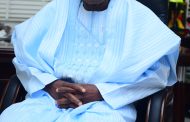
Mr. Ibbi, the student reviewer
Patrick Sunday Ibbi, a postgraduate student of the Department of English and Literary Studies, Veritas University, Abuja takes a quick look at Political Scientist and writer, Olumide Olaniyan’s latest literary outing, Akimbo in Limbo. It is irresistible saying that this review shows that it is simply not all our graduates who are unemployable as is widely believed!
Martin Luther King, Jr.’s lament, “the ultimate tragedy is not oppression and cruelty by bad people, but the silence of good people,” resonates with Olumide Olaniyan’s literary contribution in his second book of poetry, “Akimbo in Limbo”. With remarkable intelligence, daring, and penetration, the poet links nature and nurture, exposing humans’ cruel use of the environment.
Olaniyan is warning the human race not to remain silent while innumerable atrocities against nature are perpetrated, rendering nature hostile in the face of looting and violation of its resources. As a result, nature has become a hindrance to expansion, leaving the human race with a bleak future.
The collection is divided into five categories. Part One, “Homilies,” comprises twenty didactic poems cautioning readers against succumbing to misfortune, humiliation, illness, treachery, dread, and even death. It inspires us to ponder, react, and coexist peacefully with nature in an attempt to remedy the contemporary world’s issues. Through allegories and parodies, it conveys the narrative of common human obstacles and lures, as well as the consequences of submitting or addressing the circumstance.
The very first poem, “Behind Closed Doors,” exposes the atrocities committed against the poor masses by their leaders who were supposed to protect and provide for them—the evils occurring behind closed doors that manifest on the street include, but are not limited to, forced early marriage, looting, padding, and embezzlement of funds budgeted to improve the masses’ lives, and numerous others that contributed to the masses’ horrific deaths. A note from the poet reads:
This carnage you see on the streets
The mass murder of pupils for rituals
Was hatched behind closed doors
By some of these sympathisers wailing wildly
Olaniyan deploys two haikus in this section: “Eko” and “Curse of Cause.” Despite the courage with which it confronts major concerns, this section lacks an in-depth exploration of the matter illustrated with evocative imagery. While the poet succeeds in building tension and leaving the reader wanting more, the majority of the poems are written nearly in a narrative style, which a reader can mistake for prose.
Part Two, “Brain, Brawn, and Brawl,” has twenty-one poems that chronicle the conflict between people and nature from the birth of humanity through contemporary attempts at social organization. The poems in this area are concerned with the origins of ideas, conflicts, and cultural victories. The poet does well with a metaphoric picture of the insurgency that has afflicted humanity, particularly Nigeria. In “The Earth Wails in Maiduguri,” Olaniyan investigates and laments the religious extremism that feeds terrorism and makes the north-eastern Nigerian state of Borno and its environs uninhabitable for many. Hence,
In colonies bordering Maiduguri
The earth wails and wails
Famished frantic farmers flee
From ammo-laden farmsteads
In an unholy Hijra to despair
The prowlers plant men’s limbs and skulls
And water the field with blood of women
The little ones, they cast alive into burning debris
In their search for our ruler
Who, from afar, proclaimed their surrender.
Part Three, “Beneath the Skies,” is comprised of nine poems that employ timeless elements such as twilight, fire, wind, moon, sea, road, and city to create stories about faith, power, and human evolution and/or regression. This section of the collection highlights the poet’s unique interpretation through a satirical exposition of those who abandon the needy in order to impress sycophants. Politicians, particularly on the African continent, are prone to this. As the poet expresses his dissatisfaction in “Do not dance for me”:
…I am the sunlight
Do not bring me your torchlight
Give to the man engulfed by darkness
I am the land
Your sacrifice is not my meal
Feed the poor with your harvest
Sufficient for me are the remains
Do not bring drummers to dance for me
Your eulogies add nothing to my greatness
Make feasts for those in obscurity
Part Four, titled “Yearnings,” has six love songs. It is a kaleidoscope of love’s flaws, enigmatic nature, and perseverance. It attempts to explain what occurs when love dies by drawing a fine line between love and the unquenchable passions that torment both men and women.
“Vicissitudes” is the title of Part Five. The collection’s eleven poems are inspired by symbolism and elegies and are written in a range of forms, including haiku and concrete poetry. They emphasise humanity’s frailty and the critical nature of humanitarian behaviour. Olaniyan finally draws the attention of the human society to the “loud silent” voices from the “Cemetery”:
In grief, people bring the remains
Of loved ones for interment
With smiles, the cemetery gulps
The corpses in their entirety
As mourners depart, wailing
It chews the bodies in silence
Showing no pity for their woes
For without the corpses, it will die
As the living cry for their kin
The cemetery longs for its piles.
Akimbo in Limbo by Olumide Olaniyan is a thoughtful and entertaining work. The poet’s concern for environmental destruction and its consequences for human society is admirable. The poet’s diction is simple, so the common reader will have no trouble understanding him. Poetic renderings of the poems are an enhancement that should be recommended to the poet. The collection’s versification style is obviously free verses, which are somehow frequently disconnected and end up sounding like a stream of consciousness in prose.




























